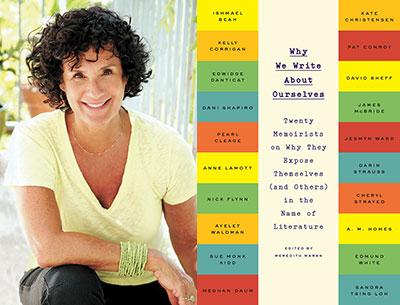Whose Story Is It, Anyway?

“Why We Write About Ourselves”
Edited by Meredith Maran
Plume, $16
“I only write what only I can write.” That is Isaac Bashevis Singer’s dictum regarding fiction, but surely it applies to the memoir as well.
In “Why We Write About Ourselves,” Meredith Maran has found 20 of the most compelling memoirists working today. Virtually all of them write fiction or poetry as well. Many of them distinguish between their fiction or poetry or personal essay writing and their memoirs. And yet the theme that resonates in these sections is the fact that many of these writers were taken aback, surprised, delighted, relieved at how important writing memoir became for them.
Ms. Maran has used this format very successfully in a previous volume, “Why We Write,” which featured discussions with notables such as Meg Wolitzer, Walter Mosley, Gish Jen, Sebastian Junger, and Isabel Allende. In this volume, Ms. Maran has asked A.M. Homes, Dani Shapiro, Pat Conroy, Edwidge Danticat, Anne Lamott, Nick Flynn, James McBride, and 13 others about their thoughts, their pains, their disappointments, their successes in writing the memoir.
For each entry Ms. Maran includes a snippet of the writer’s published memoir and writes an intro to orient the reader as to the writer’s strengths and accomplishments. Then she provides a thumbnail bio. And then — ta-da — she begins the interview. Questions regarding what’s important to the author. What works. What doesn’t. What the pitfalls are. There are a number of themes that run resoundingly through this volume. How to keep from hurting people. How to get at the truth. What is the truth? What is explosive? What is tedious? What truly matters?
This is a book designed to be dipped into. Because there is so much wisdom in these pages. So much is distilled. The very act of creating a memoir requires so much writing, sifting, considering, and more analysis.
Take, for example, A.M. Homes. Ms. Maran quotes an interviewer labeling Ms. Homes as “a social arsonist.” And then we get to the interview. Ms. Homes outright says: “I don’t like writing about myself.” She talks about the fact that rather than “Write about what you know,” she’d prefer to “Write about what you don’t know.” Her memoir sprang from a New Yorker essay she wrote about meeting her biological parents. She’d wanted to organize then stow away that information. But as she went on, she discovered that she needed to understand “primitive emotional experiences.” She struggled with protecting characters, with understanding how to tell the whole truth.
Ms. Maran posed the question: “Whose story is it, anyway?” Ms. Homes realized that a memoir should do some good. “And not just for the memoirist.” She welcomed hearing from other people who had been adopted. In this text, Ms. Homes, the “social anarchist,” declares that “controversy is not a bad thing.”
In Dani Shapiro’s memoir “Devotion” she writes about her childhood, religion, and spirituality. She was raised by Orthodox Jews. In Ms. Maran’s introduction, she quotes Ms. Shapiro as saying that “Being yourself is hard, hard work.” Ms. Shapiro’s talk about what turned her to memoir-writing makes evident what was excruciating. After having written three novels, Ms. Shapiro realized that “I needed to stop fictionalizing the story that was haunting me: my parents’ car accident, my father’s death, my mother’s broken bones, the way my entire family changed in an instant. Telling the story in my novels, I hadn’t remotely accomplished what I’d hoped. The only way to do that was to write it as memoir.”
“I’m not a believer in memoir as catharsis. It’s a misapprehension that readers have that by writing memoir you’re purging yourself of your demons. Writing memoir has the opposite effect. It embeds your story deep inside you.”
And then she provides yet another deep truth about telling the truth: “Truth in memoir is a lie.” But not the kind of lie you think of as a lie about stealing from the cookie jar.
“Memory is utterly mutable, changeable, and constantly in motion. You can’t fact-check memory.”
In section after section, Ms. Maran gives us the deepest truths about the complicated importance and craft of memoir. Edmund White advises: “Cut to the chase. Don’t burden yourself with lots of exposition.” Somewhat surprisingly, Jesmyn Ward says that “Unlike with fiction, it’s easiest to write a memoir from an outline.” And then she says: “You get the most powerful material when you write toward whatever hurts.” Ayelet Waldman announces: “If you’re not uncomfortable and scared while you’re writing, then you’re not writing close enough to the bone.”
And suddenly there are Cheryl Strayed’s thoughts: “The most powerful strand in memoir is not expressing your originality. It’s tapping into your universality.” She goes on to say: “Good writing is built on craft and heart. Another way of saying it is you must do your work and it must cost you everything to do it.” Yes. Heart. Yes. The core.
Perhaps the wryest lines in this compendium? Gloria Swanson’s: “I’ve given my memoirs far more thought than any of my marriages. You can’t divorce a book.” Bravissima. Because the memoir requires thought and planning, and great luck and a great story and the deepest of honesty. And, above all, true love.
Laura Wells is a regular book reviewer for The Star. She lives in Sag Harbor.
A.M. Homes lives part time in East Hampton, and Dani Shapiro is a former Sag Harbor resident.
